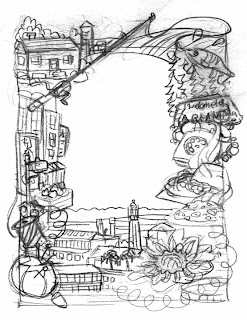Here we go... Another illustration based on food, although
hardtack barely qualifies! (
Here are some other
food-related illustrations I've done).
Hardtack is flour and water baked into a nigh-invulnerable biscuit. If you want to get fancy you can add salt or even shortening, but real hardtack is almost more of a building material than a foodstuff. It's calorie-dense, fairly light, and will keep for ages if stored properly (historically, improperly stored hardtack was plagued by weevil larvae yet still eaten; best not to think about this).
Here is a recipe for you to make your own hardtack. After you've finished baking it, the author of the recipe advises you keep it out in the open air for a few days. "He writes "When it has the consistency of a brick, it is fully cured." Bon
appétit :P.
Because of its convenience hardtack remains a mainstay of sailors, soldiers, and explorers. Ancient Egyptians baked an early form of hardtack using millet. Romans soldiers had buccellum. King Richard the Lionheart took it with him on Crusade. Royal Navy seamen gnawed on ship's biscuits and Civil War soldiers on both sides ground their teeth against hardtack's unyielding surface. Japanese soliders ate wee biscuits called kanpan, while Russian Navy have galeta in their rations. Civilians in Alaska and Hawaii (both remote areas that benefited from hardtack's shelf-stability) enjoy hardtack as a snack food, and explorers still bring it with them on expedition.
Inked version. I made a few adjustments, such as the size of the Egyptian's millet loaf on the far left (looks more like a cracker than a loaf here) and the kanpan in the Japanese soldier's hands are way too big.
Pencil sketch:
Preliminary sketch. I was originally going to have weevil larvae poking out of the main bit of hardtack in the middle of the background, but good taste prevailed!
Hardtack.
Source: Wikipedia
-- Julia








.jpg)


